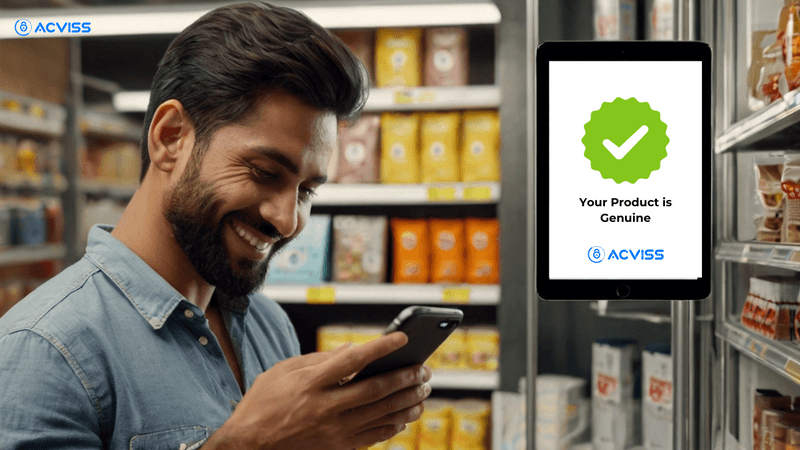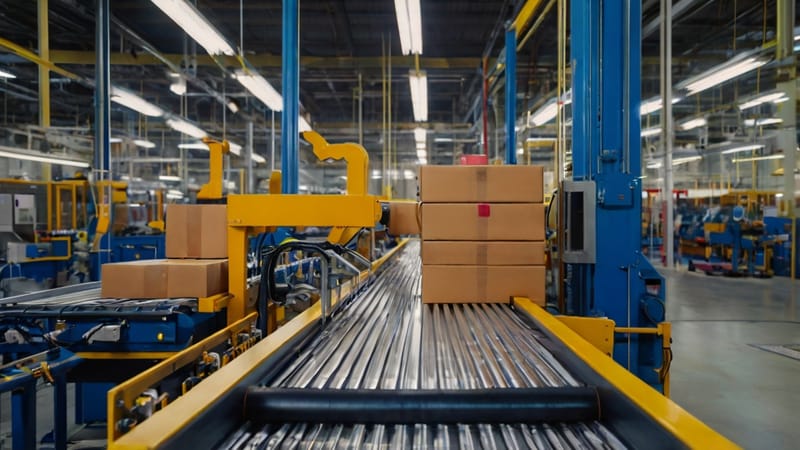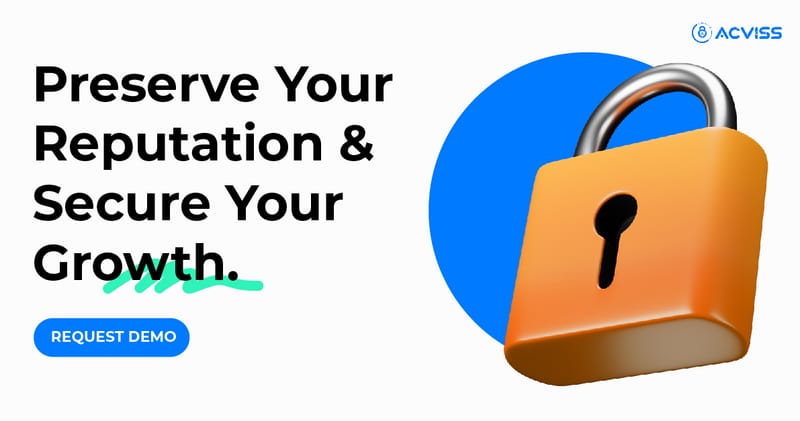How Brand Benefits from Anti-Counterfeiting Solutions: Why You Should Have One!

Counterfeits are everywhere. Whether you are aware or not, your brand and your competitor are facing the threat of counterfeits. From luxury goods to everyday items, fake products are flooding the market, causing significant brand losses and posing risks to consumers. But what can brands do to combat this issue? That's where anti-counterfeiting solutions come in. So, today let's look at how these solutions can benefit your brand in multiple ways.
Understanding Anti-Counterfeiting Solutions
There is no one-size-fits-all solution for preventing counterfeits. Depending on the brand, industry, nature of business, scale and budget, anti-counterfeiting solutions differ.
Types of Anti-Counterfeiting Measures
Physical Security Features
Physical security features are overt solutions that provide a visual cue without the use of any other technology.
These include,
- Holograms
- Watermarks
- Innovative style of packaging
- special inks that are difficult to replicate.
Digital Authentication Techniques
Digital techniques, unlike the above ones, are sophisticated and require the assistance of a digital device to authenticate such as a mobile or a scanner.
QR codes and RFID tags, allow for electronic verification of product authenticity. These methods can be integrated with mobile apps, providing an easy way for consumers to verify products instantly.
But with technological advancement, AI, Blockchain and IoT have enabled brands to secure their products and supply chain across online and offline channels accurately and efficiently.
Must Read: 5 tips to choose the right Anti-counterfeit solution
Benefits of Anti-Counterfeiting Solutions for Brands

Beyond the basic protection against fake goods, anti-counterfeiting solutions offer a range of advantages that strengthen a brand's position in the market. From increasing your sales to long-term growth, here are five benefits from an advanced perspective:
1. Protecting Brand Reputation
Your brand's reputation is one of its most valuable assets. Counterfeit products can tarnish this reputation, leading to customer distrust and a decline in sales. Implementing anti-counterfeiting measures ensures that only genuine products reach consumers, upholding brand protection and maintaining the integrity of your brand.
2. Safeguarding Consumer Trust
Consumers rely on brands to provide safe, high-quality products. When counterfeit items infiltrate the market, this trust is compromised. Anti-counterfeiting solutions help safeguard consumer trust, ensuring product authenticity, which is crucial for maintaining customer loyalty and brand credibility.
3. Protecting Revenue Streams:
Counterfeits directly eat into a brand's sales. Anti-counterfeiting solutions disrupt the distribution of fake goods, minimizing lost revenue and protecting market share. A strong brand reputation due to effective anti-counterfeiting translates to premium pricing and higher customer loyalty, ultimately boosting brand value.
4. Strengthening Intellectual Property (IP):
Anti-counterfeiting programs demonstrate a brand's commitment to protecting its trademarks, patents, and designs. This proactive stance deters potential counterfeiters and strengthens IP ownership. Detailed records of product movement through the supply chain, facilitated by anti-counterfeiting solutions, provide stronger evidence for legal action against counterfeiters.
5. Advanced Security and Analytics:
Track and trace functionalities integrated with anti-counterfeiting solutions offer real-time insights into product movement. Solutions like Origin amalgamated the power of blockchain with non-cloneable unique label technology to create unparalleled traceability in the supply chain. This transparency helps identify vulnerabilities and improve supply chain security.
Authentication data collected through the solution provides valuable insights into counterfeiting trends and consumer behaviour. Brands can leverage this data to refine strategies and optimize product protection.
Must Read: Your guide to building an authentic brand in 2024

Disadvantages of Anti-Counterfeiting Solutions
Anti-counterfeiting solutions are essential for protecting brands and consumers from counterfeit products. However, implementing these solutions comes with its own set of challenges.
1. High Implementation Costs
One of the primary disadvantages of anti-counterfeiting solutions is the high cost associated with their implementation. Advanced technologies and security features can be expensive, especially for small and medium-sized businesses.
Overcoming the challenge of cost
- Budget Allocation
To manage high implementation costs, companies should understand their requirements and allocate a dedicated budget for anti-counterfeiting measures. This ensures that resources are available without impacting other critical business areas.
Conducting a thorough ROI analysis can help justify the expenditure on anti-counterfeiting solutions. Highlighting the long-term benefits, such as increased sales and enhanced brand reputation, can support investment decisions.
2. Complexity and Integration Issues
Integrating anti-counterfeiting measures into existing systems can be complex and time-consuming. This often requires significant changes to supply chain processes, IT infrastructure and rigorous training exercises, which can be daunting for many companies.
Overcoming integration challenges
- Choosing Compatible Solutions
Selecting anti-counterfeiting solutions that are compatible with existing systems can simplify the integration process. Working with solution providers who offer flexible and customizable options can ease the transition.
Implementing anti-counterfeiting measures in stages can help manage complexity. A phased approach allows companies to address integration challenges incrementally, reducing the risk of disruption.
3. Consumer Resistance
Some consumers may resist the use of new authentication methods, either due to a lack of understanding or perceived inconvenience. This resistance can hinder the effectiveness of anti-counterfeiting solutions.
Overcoming the challenge of customer unawareness
- Educating Consumers
Educating consumers about the importance and benefits of anti-counterfeiting measures can reduce resistance. Clear communication and informative campaigns can help consumers understand the value of these solutions.
Ensuring that authentication methods are user-friendly and convenient can also mitigate consumer resistance. Simple, intuitive processes encourage consumer participation and support the effectiveness of anti-counterfeiting measures.
4. Technological Limitations
While technology plays a crucial role in combating counterfeiting, it is not infallible. Technological limitations, such as system vulnerabilities and the potential for hacking, replication or tampering, can undermine the effectiveness of anti-counterfeiting measures.
Overcome the technical challenges and become tech-savvy
Regular upgrading is essential to keep anti-counterfeiting solutions effective. Staying informed about the latest advancements and incorporating updates can help maintain robust protection. Choose solutions that can adapt to the changing situations.
Investing in scalable and adaptable solutions can mitigate the risk of obsolescence. Future-proof technologies that can evolve with the industry ensure long-term effectiveness.
5. Potential for Obsolescence
As technology evolves, anti-counterfeiting solutions can become obsolete. Staying ahead of counterfeiters requires continuous investment in new technologies, which can be a significant burden for companies.
- Scalability and Flexibility
Choosing scalable and flexible anti-counterfeiting solutions allows companies to adjust and expand their measures as needed, keeping pace with technological changes and market demands.
Partnering with reputable solution providers who offer strong support and collaboration can help navigate the challenges of obsolescence. These partnerships ensure access to the latest innovations and expert guidance.
How to Implement Anti-Counterfeiting Solutions

Start by evaluating your brand's specific needs. Consider the type of products, market presence and potential risks of counterfeiting.
Research and compare different solution providers. Look for those with a proven track record and advanced technologies that suit your brand's requirements.
Ensure that the chosen anti-counterfeiting solutions can be seamlessly integrated with your existing supply chain and ERP systems. This will facilitate smooth implementation and operation.
- Cultivate a Brand Protection Culture
It is essential that not just you, but the entire organisation supports the idea of anti-counterfeiting and works together to ensure the same.
Must Read: Learn how to build a proper brand protection culture for your brand
Future Trends in Anti-Counterfeiting
The future of anti-counterfeiting lies in cutting-edge technologies such as AI, blockchain and IoT. These technologies will continue to evolve, offering even more robust solutions to combat counterfeit products.
However, combating counterfeiting is not an isolated effort. Brands, governments and organisations worldwide collaborate to develop standards and share best practices, creating a united front against counterfeiters.
The benefits are clear, making anti-counterfeiting solutions an essential investment for any brand serious about maintaining its integrity and market position. But make sure you understand your brand needs and find the right anti-counterfeit solution to meet them.
If you are wondering how to implement a solution or what technology to choose from, feel free to get in touch with us. We, at Acviss have protected over 2 billion products, catering to over 80 brands globally. Our advanced anti-counterfeiting and brand protection solutions are always at your disposal. Reach out to us here to meet our experts and take your first step towards counterfeit-free market growth.
FAQs
1. What are the most effective anti-counterfeiting solutions?
The most effective solutions often combine physical security features with digital authentication techniques, leveraging advanced technologies like blockchain and AI.
2. How do anti-counterfeiting measures enhance customer trust?
Anti-counterfeit measures ensure that customers receive genuine products, which builds trust and confidence in the brand.
3. Can small businesses benefit from anti-counterfeiting solutions?
Absolutely. Even small businesses can protect their brand and customers by implementing scalable and cost-effective anti-counterfeiting measures.
4. What role does technology play in anti-counterfeiting?
Technology is crucial, offering advanced tracking, authentication, and verification methods that are difficult for counterfeiters to replicate.
5. How can a brand choose the right anti-counterfeiting solution?
Brands should assess their specific needs, research solution providers, and ensure seamless integration with existing systems for the best results.
